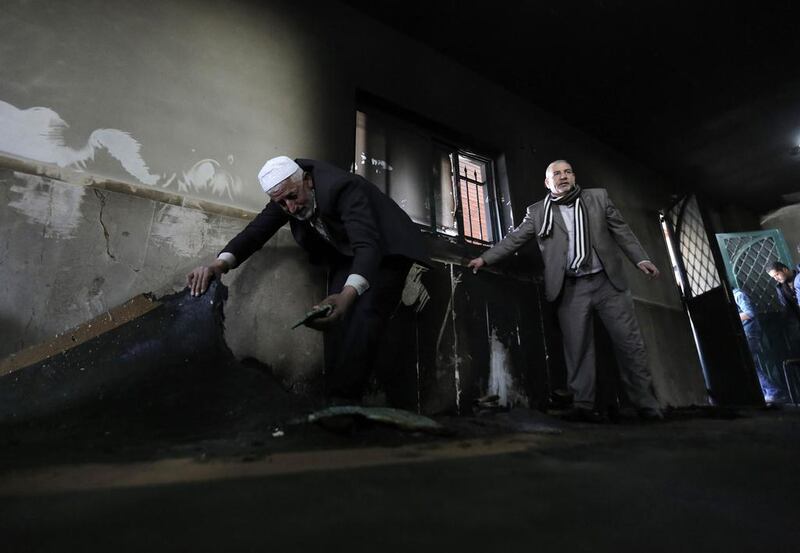JABAA, WEST BANK // Palestinians were quick to paint over burn marks inside Al Hoda mosque in the West Bank village of Jabaa but fear persisted as another apparently religion-based attack shook Jerusalem.
Suspected Jewish extremists set fire to the mosque under the cover of darkness on Wednesday in an assault that Palestinians and Israeli human rights groups say is far from an isolated incident.
Furthering concerns over an increase in religious tensions, assailants — also suspected Jewish extremists — on Thursday set fire to a Greek Orthdox seminary.
The attackers left graffiti reading “Redemption of Zion”, similar to that scrawled over Al Hoda mosque.
Noman Hamdan, the mayor of Jabaa, blamed Jewish settlers for the mosque attack. “People here are afraid. I expect the settlers will continue their aggression,” he said.
Jabaa residents noticed the mosque burning around 4am, when they rose for work. They quickly worked together to put the fire out. Inside the mosque, a carpet was burnt, along with large parts of the ceilings and walls.
A window was broken and it was through this that flammable material was apparently thrown into the mosque and set alight.
Black graffiti scrawled on the mosque’s exterior depicted a Star of David with the word “revenge” in Hebrew letters. Next to it was written, “We want the redemption of Zion.”
There were no injures in either of the attacks. Israeli media reports said police would check if there is a connection between them.
Jabaa resident Abdul Rahim Mahmoud, 52, said the mosque attack came after several violent incidents in the area involving settlers over the past year, including the wounding of a Palestinian shepherd by gunfire and the destruction of olive trees owned by residents.
Mr Mahmoud said no one was jailed for the shooting of the shepherd “but if a Palestinian throws a stone he will go to prison for a long time”.
Israeli police have jurisdiction over criminal issues among the Israeli settlers and among Palestinians that live in areas, like Jabaa, that are not ruled by the Ramallah-based Palestinian Authority.
Attacks by Israelis against Palestinians in the occupied West Bank are “routine”, according to Noa Cohen of Israeli human rights group Yesh Din.
These include violence against persons, harm to property, arson, theft, and the destruction of trees, many of which provide Palestinians’ with their livelihoods, she said.
Yesh Din has documented eight cases in which mosques were set on fire in the West Bank since 2006. No one has been arrested in any of the cases.
Mr Cohen charged that there is “negligence” and “failure” by the Israeli police when it comes to investigating crimes against Palestinians.
“They don’t go to the scene of the incident to collect evidence, they don’t have line-ups, in many cases they don’t even bother going over CCTV footage. In the rare cases where they have suspects, police don’t try to confirm the alibi.”
Between 2005 and 2014, Yesh Din monitored 1,045 files opened by Israeli police following Palestinian complaints. Only 7.4 per cent of these complaints led to indictments of Israeli civilians suspected of attacking Palestinians and their property, according to the group.
Police spokesman Mr Rosenfeld dismissed Mr Cohen’s criticisms. “Police activities continue in order to prevent and to respond to incidents of crime with a nationalist motive,” he said.
But Danny Dayan, a settler leader, also said the way Israeli security forces handle violence against Palestinians is inadequate.
“We as community leaders do our utmost on the educational level, but the law enforcement agencies should do their work more actively. This means catching those who carry out attacks, bringing them to justice and giving them harsh sentences.”
In Jabaa, there was defiance alongside the fear of more attacks.
In white letters, fresh graffiti written on one of the mosque’s walls read: “Whatever you burn, we stay in this land and in our mosque we pray.”
foreign.desk@thenational.ae





